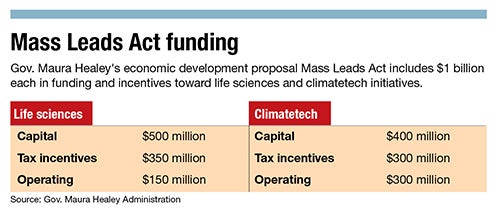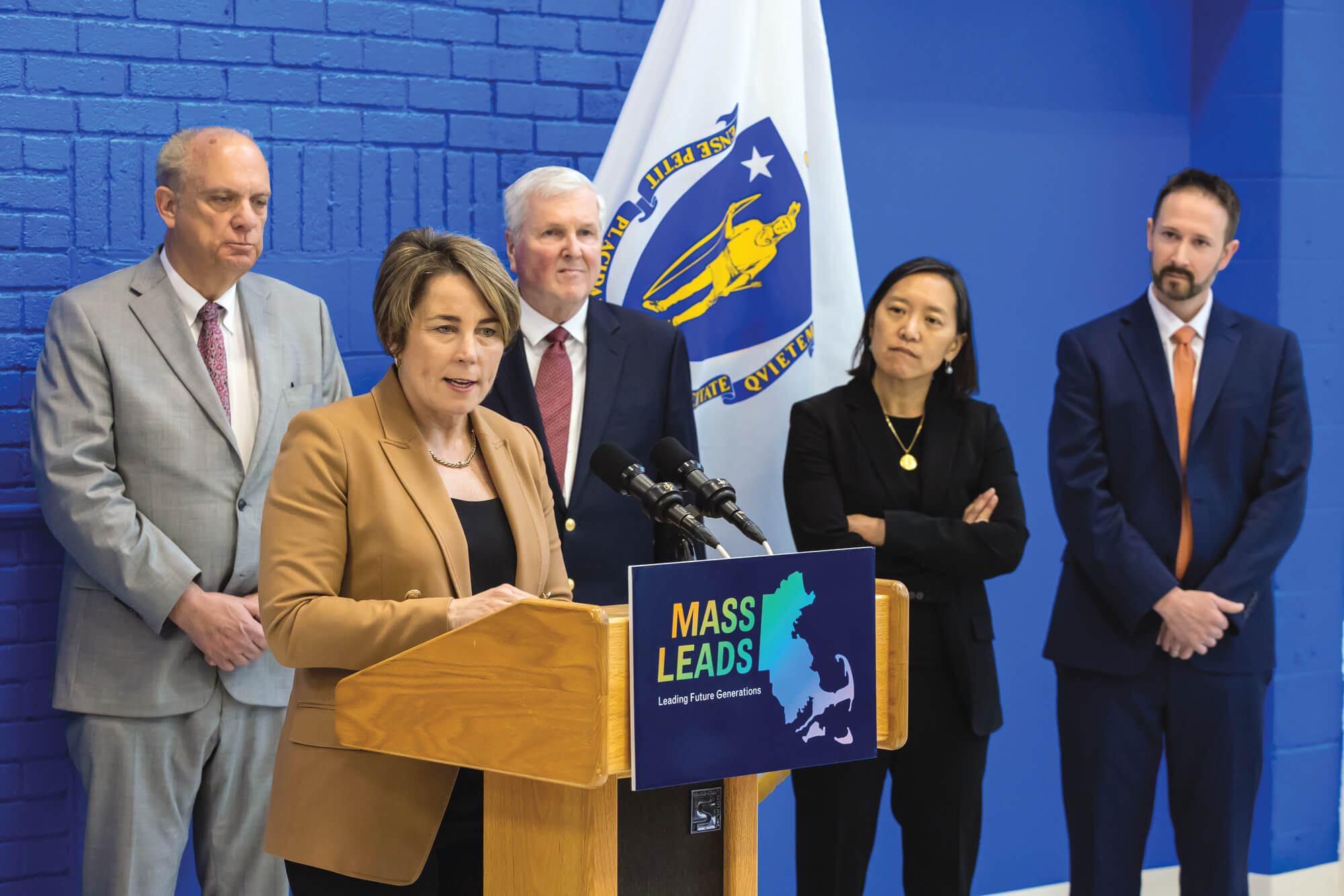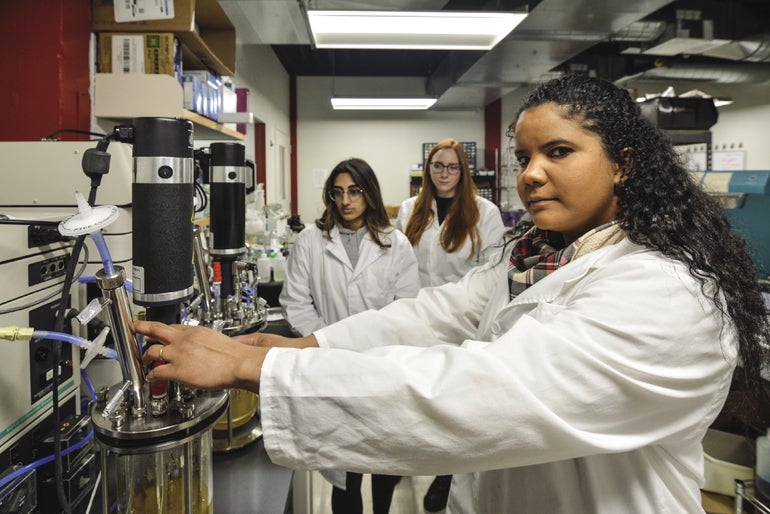For the burgeoning life sciences hub that is Central Massachusetts, Governor Maura Healey’s $3.5-billion Mass Leads Act economic development proposal looks to add fuel to fires.
Get Instant Access to This Article
Subscribe to Worcester Business Journal and get immediate access to all of our subscriber-only content and much more.
- Critical Central Massachusetts business news updated daily.
- Immediate access to all subscriber-only content on our website.
- Bi-weekly print or digital editions of our award-winning publication.
- Special bonus issues like the WBJ Book of Lists.
- Exclusive ticket prize draws for our in-person events.
Click here to purchase a paywall bypass link for this article.
For the burgeoning life sciences hub that is Central Massachusetts, Governor Maura Healey’s $3.5-billion Mass Leads Act economic development proposal looks to add fuel to fires.
Filed on March 1, the omnibus bill aims to secure Massachusetts as a global leader and pioneer in the life sciences, climatetech, and applied artificial intelligence industries. For Central Massachusetts, industry leaders say these funds could mean more jobs, more robust funding for startups and company initiatives, reduced drug costs, and strengthened municipal infrastructure.

“The investments we’ve made till this point have helped establish Massachusetts as the global leader in the biotechnology industry,” said Jon Weaver, president and CEO of Worcester-based Massachusetts Biomedical Initiatives. “Our feeling is that this round of the bill will help us maintain that dominance but also then really help extend the success of that industry outward from Boston and Cambridge, and that’s the piece that we’re really excited about.”
Establishing Worcester as a hub
MBI, a life sciences incubator in its 40th year, is focused on establishing Central Massachusetts as a global biotech and biomanufacturing hub while creating jobs with upward mobility for community residents. Weaver, who has been CEO of MBI since 2019 after acting as chief operating officer since 2015, is a prominent proponent of the Leads Act and is enthusiastically optimistic about the bill’s potential impact on the area.
The proposal is a playbook for accomplishing the goals outlined in the Gov. Maura Healey Administration’s 2023 economic development plan, Team Massachusetts: Leading Future Generations. The 2023 initiative was compiled after a series of regional listening sessions to gather perspectives and insights from business, legislative, and community leaders.

In total, the Mass Leads Act looks to invest $3.5 billion in critical investments, recommending $1.75 billion in bond reauthorizations for programs with a proven history of cultivating economic and community growth, $1 billion in bond authorizations for initiatives promoting equity throughout the state, and $750 million in funds allocated for statutory changes to economic development tax programs.
Included in recommended funds are two $1 billion, 10-year initiatives: one to reauthorize the Life Science Initiative originally established in 2008 and the other to invest in climatetech and compete in the emerging clean energy sector.
“There’s a piece in [the act] that would go towards establishing essentially tech hubs in Worcester and in Springfield, providing some resources to really help those industries flourish in those areas,” said Weaver, referencing the bill’s $75 million for a new Massachusetts techhub capital program. “We're really excited about that because it just shows the partnership we’ve had with the Commonwealth and the excitement that they have around the work we’ve been doing here in Central Mass.”
Lina González, founder and CEO of MBI-incubated company SpadXTech, hopes the Leads Act funding will help advance biomanufacturing tools, namely bioreactors. González wants to see bioreactors, fermentation devices used to culture cells, made to be both more efficient and lower-cost for researchers.
She hopes the funds will make founding a business in fields like biomanufacturing and the life sciences, where a lot of the barrier to entry rests on capital, more accessible for entrepreneurs. Reflecting on her early days with SpadXTech, González recounted just how difficult it is for entrepreneurs to raise the money needed to launch their businesses.
“Starting off, nobody wants to give you money,” said González. “The minute somebody gives you money, everybody wants to give you money. But when you first start, you haven’t validated yourself yet.”
Helping life sciences startups
González credits MBI with affording her a financially feasible way to launch her own startup by offering her lower rent in Worcester, an area she said is ideal for budding businesses and established companies looking to expand. The availability of physical space to turn research into manufacturing facilities distinguishes Central Mass. from other tech-heavy hubs of the state, such as Boston and Cambridge, she said.
“There's a huge value proposition to being 50 minutes away from your R&D headquarters. The ability to just be able to drive out when you find an issue and get back by lunch is massive,” said Weaver.

Coming out of those metropolitan hubs, Weaver said, are thousands of drugs needing to go through thorough testing, another area in which he said the Leads Act is taking a thoughtful approach. As opposed to financing development of core AI, Weaver said the bill is looking to fund ways to apply existing AI to different industries, with a $100-million applied AI hub capital program.
“A big part of why drugs are so expensive is because in order to figure out that one drug, they have to go in a lab and they have to test 50 different, 100 different, possibilities before they define the one methodology that really makes the most sense,” said Weaver. “AI has the potential transformative impact to be able to say, instead of having to try it a hundred times, through AI, we might be able to say these are the five we should try; and that can really reduce the cost of drug development and really expedite how we can bring products to patients.”
Using funding to implement AI in this way has the potential to transfigure the U.S. Food & Drug Administration approval process and, in turn, have a remarkable impact on the price of prescription drugs, Weaver said.
Economic impact
The Leads Act will help Central Massachusetts communities attract more companies, said Meredith Harris, executive director of the Marlborough Economic Development Corp.

“What we do everyday is try to attract and retain business to the community, and the Leads Act just seems to continue to enable that and gives us more tools in our tool box when we’re out trying to attract companies to Central Mass. and specifically to Marlborough,” Harris said.
Public money invested into attracting these businesses tends to be returned many times over in economic activity, she said.
“The investment that these companies, the life sciences in particular, the investment they make in their property and in their space is significant,” said Harris. “So that’s all revenue coming back to the communities that they choose to be a part of. And then all the people that they bring in every day that are eating in our restaurants, getting gas on their way out the door, sleeping in our hotels, all of that stuff helps support the local economy.”
The reauthorization of the Life Science Initiative and funding for small businesses, which includes the bill’s recommended $25 million for small business technology grants, is a highlight of the effort, she said.
The bill’s investments are investments into jobs and the future of Massachusetts’ economy, Weaver said, which directly translates to tax revenue.
Other states such as Rhode Island, Texas, and Georgia are developing similar plans to the Mass Leads Act and have benefited from seeing the type of economic and workforce success that the state has had implementing these kinds of initiatives over the years, he said.
“To think that we can have that same type of effect for the next 10 years based on an investment like this, I just think is amazing,” Weaver said.

